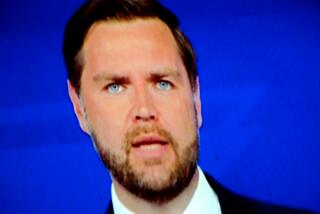COLUMN LEFT/ GEORGE BLACK : TV Tinkering Won’t Plumb Bush Mystique : Challengers must engage Bush on his record during TV debates, not worry about the format.
- Share via
The 1988 presidential debates between George Bush and Michael Dukakis still linger in the memory, like the taste of bad fish. Aware of this, the TV networks propose to change the format in 1992, with a single moderator presiding over three prime-time encounters by presidential hopefuls and a fourth for the vice-presidential candidates.
The idea has already been dismissed out of hand by Frank J. Fahenkopf Jr. and Paul G. Kirk Jr., the joint heads of the bipartisan Commission on Presidential Debates, which sponsored the 1988 fiasco. They deride the notion that commercially motivated TV executives should be the arbiters of the nation’s political standards.
This is a fair, if self-serving, point. American television, as currently structured, does not allow for the kind of public service pre-election programming that is commonplace in Western Europe. The network execs also bear a heavy responsibility for the declining quality of political discourse over the last decade. It is their choices that have eroded the boundaries that used to divide news programming from entertainment. And there is no shortage of people in network TV whose idea of a spruced-up debate would be to subject each candidate to a session with Geraldo Rivera and a studio audience.
But even supposing good faith on the part of the networks, the core problem can’t be solved by tinkering with the medium. The quality of any debate will rest, in the end, on how the Democratic challenger chooses to engage George Bush on his record.
Each of the sudden parade of Democratic hopefuls has tried to make capital out of the yin/yang character of the Bush presidency--conceding his mastery of foreign affairs, condemning his indifference to social collapse at home. Sidney Blumenthal, an astute commentator, calls Bush “the half-President,” whose idea of the job “is akin to the French one, of a president who meets and knows heads of state.” It’s a safe bet that few voters would even recognize the name of Bush’s domestic policy adviser, Roger Porter.
But as an electoral strategy, dwelling on this may prove self-defeating. It concedes too much, and it fails to recognize that the two George Bushes are actually one and the same.
The Democrats need to see that Bush’s neglect of issues like health care and education is not an accident or a matter of incompetence. It proceeds from his rational, if deeply cynical, view that doing nothing about a crisis may be safer than having a clear policy that exposes one to attack.
A Democratic contender might then pursue this logic into the sacred arena of foreign affairs. He could start by questioning whether Bush has in fact shown any special skill in handling the end of the Cold War, or whether he has simply ridden the coattails of a low-risk situation that happened to coincide with his presidency. The challenger could ask whether the shape of East-West relations would be that much different today if Dukakis, or for that matter Warren G. Harding, had been in office for the last three years.
Worse, much of Bush’s inertia has been calculated to placate the extreme right wing, represented by men like his nominee to head the CIA, Robert Gates. As economic collapse was giving the Soviet coup plotters the pretext that they needed to strike, Bush was denying aid in the name of prudence. Even now, the easy decision that Bush has taken to scrap short-range nuclear missiles says less about the man than his continued pursuit of such lunatic anachronisms as the B-2 bomber and the “Star Wars” program.
By accepting the hollow Bush mystique in foreign policy, and by misunderstanding the reasons for his passivity in domestic affairs, the Democrats only play to the President’s strength. A TV debate conducted on these terms, whatever the format, is likely to be as unilluminating as the confirmation hearings for Supreme Court nominee Clarence Thomas.
Having failed to elicit anything from Judge Thomas but evasions and platitudes, members of the Senate Judiciary Committee are now to be heard muttering that the review procedure itself needs to be reviewed. They sound, in fact, a lot like those network execs talking about the 1992 debate.
If a skillfully coached minor-leaguer like Thomas can stonewall two weeks of Democratic questioning, why should anyone imagine that 90 minutes on TV will reveal the true character of an incumbent President--let alone one who has dedicated his political career to avoiding the smoking gun and the damaging sound bite? To try to raise the tone of American politics by changing the ground rules for a televised debate is, in the old cliche, a little like rearranging the deck chairs on the Titanic.
More to Read
The complete guide to home viewing
Get Screen Gab for everything about the TV shows and streaming movies everyone’s talking about.
You may occasionally receive promotional content from the Los Angeles Times.






